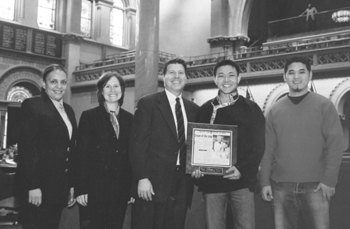|
Public Hearings/Roundtables
Small business owners can provide valuable information for the formulation of public policy through
discussions, hearings or roundtables. By holding these forums, the Small Business Committee can
focus its energy on legislation that will benefit the State as a whole.
The Effectiveness of Article 15-A of the Executive Law – On February 23, 2005,
the Committees on Governmental Operations, Corporations, Authorities and Commissions, and Small
Business, the Black, Puerto Rican and Hispanic Legislative Caucus, the Task Force on Women’s Issues, and
the Puerto Rican/Hispanic Task Force held a hearing in Utica, New York to determine whether minority and
women-owned business enterprises are being provided with equal opportunities to contract with agencies of
New York state government. The hearing was well attended by trade groups, business organizations and minority
and women business owners who shared their experiences and suggestions on how the legislature can assist
minority & women-owned businesses receive additional State contracts.
The Reauthorization of Article 15-A of the Executive Law – On March 3, 2005, the
Committees on Governmental Operations, Corporations, Authorities and Commissions, and Small Business,
the Black, Puerto Rican and Hispanic Legislative Caucus, the Task Force on Women’s Issues, and the Puerto
Rican/Hispanic Task Force held a hearing in New York City to examine the implementation of Article 15-A by State
agencies and authorities. Those in attendance at the hearing shared their experiences and suggestions on what
modifications could be made to 15-A to assist in attracting and retaining minority and women-owned businesses
as State contractors for goods and services.
Access to Surety Bonding on State Contracts for Small, Minority and Women-Owned
Businesses – On April 14, 2005 the Committees on Governmental Operations, Corporations, Authorities
and Commissions, and Small Business, the Black, Puerto Rican and Hispanic Legislative Caucus, the Task Force
on Women’s Issues, and the Puerto Rican/Hispanic Task Force held a hearing in New York City to learn more about
the extent to which statutory bonding requirements for State projects pose a barrier to small, minority and
women-owned businesses seeking to obtain State contracts, and to examine the effectiveness of State bonding
assistance and bond waiver programs.
Examination of the Procurement Stewardship Act and Procurement Issues – On
September 27, 2005 the Committees on Governmental Operations, Local Government, Small Business,
Environmental Conservation, Oversight, Analysis and Investigation, the Commission on Government Administration
and the Subcommittee on Oversight of the Department of Environmental Conservation held a hearing to review the
effectiveness of the Procurement Stewardship Act. In 1995, the Procurement Stewardship Act (State Finance Law,
Article 11) was enacted in order to consolidate, codify and update the procurement laws of New York State.
Recognizing that the law would need to be periodically reevaluated, the Legislature enacted an original sunset date
of 2000 for the law. At that time it was renewed for an additional five years. This year, a one-year extender was enacted
in the budget, providing additional time for a reevaluation of New York State’s procurement law. When the Stewardship
Act was renewed in 2000, a number of significant changes were made to the State Finance Law. This hearing
obtained information in order to review the impact of those changes.
|


 Assemblymember Mark Weprin meets with: Business Outreach Center (BOC) Director
Nancy Carin; Assistant Director Mercedes Gomez (second from left); and BOC clients
Thupten Tenphel & Lobsang Tsultrim (left), former employees and now new owners
of East Village Cheese Shop in Manhattan, in the Assembly Chamber.
Assemblymember Mark Weprin meets with: Business Outreach Center (BOC) Director
Nancy Carin; Assistant Director Mercedes Gomez (second from left); and BOC clients
Thupten Tenphel & Lobsang Tsultrim (left), former employees and now new owners
of East Village Cheese Shop in Manhattan, in the Assembly Chamber.